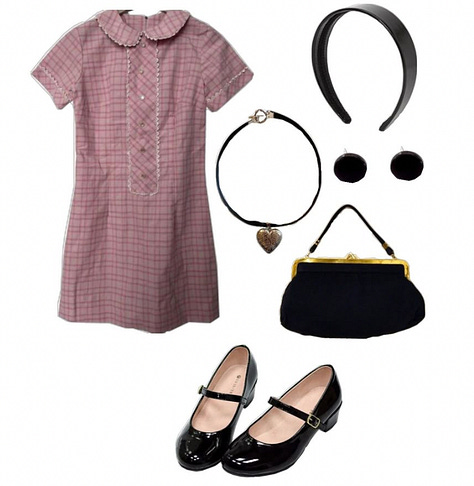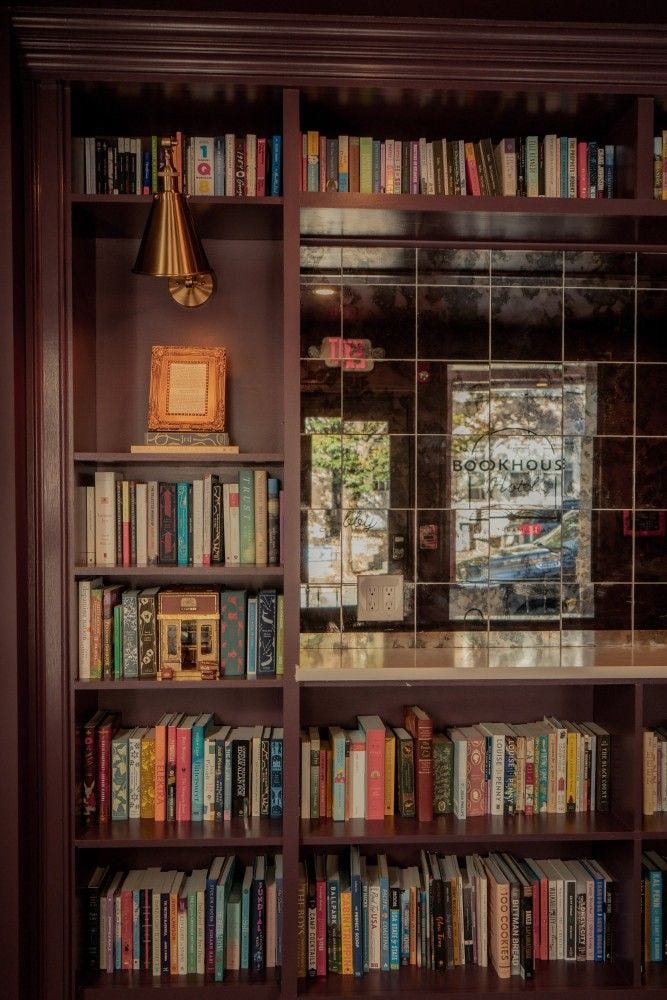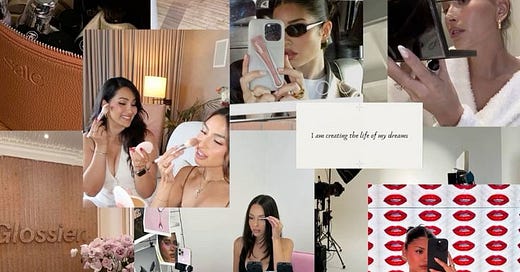london reeks of insecurity this February, and i think i know why.
weaving in and out of the streets, steam pouring from the grates onto the ankles, peering suspiciously closely at the passers by, scrutinising strangers on the tube, you begin to notice things that maybe weren’t there before.
lip filler, previously the domain of professional ladies and media personalities, has become ubiquitous, sported by everyone from the tesco cashier to the freshly-adult students drinking matcha at Blank Street. that in itself isn’t so egregious, but there’s a formula stolen from faux-friendly Scandinavian girls on the internet that adds up uneasily, including tan-touring, pearlescent bronzer, Too Faced Lip Injection if you can’t shill for the real thing, short gel nails, sambas or vejas or diabolical Ganni flats, baccarat rouge or Prada candy, and those “Bottega inspired” Zara earrings paired with a cheap plastic woven tote bag. if that isn’t you, no worries, there’s always cherry-flavoured Dior lip glow, knockoffs of the Lana Del Rey spoon necklace, Brandy Melville tanks, and variations on a theme of Mary Janes with tights or cute socks. maybe you’re a tired mum-on-the run sporting a full-length puffer coat, or a guy who’s recently gotten into beanies and small plates restaurants, or a millennial who loves dopamine dressing, wavy lines, Trip CBD and All Things Butter, but the point is nonetheless the same.
every aspect of these formulae is carefully selected, chosen with the utmost detail and attention, but not by you.






i’ve been in the rooms where it happens and maybe you have too, where they (we) foster The Want with marketing funnels, trend cycles, undisclosed influencer partnerships, customer relationship managers, airbrushed models and artfully lit photoshoots curated to make them look ‘candid’ and ‘relatable’. influencers doing ‘no buy’ years have fought back valiantly in an effort to do something that people on budgets have been doing tirelessly since forever, and most sustainability campaigns are a concession to customers willing to be ‘conscious’, but not quite willing to curb their relentless consumption.
the crux of the matter is this - until we foster a societal zeitgeist that doesn’t valorise consumption for the sake of it, we will never regain a sense of individuality, and we will never stop lining the pockets of companies whose business model relies on taking your security away with one hand and selling it back to you with the other.
this is far easier said than done, but i like to start by refusing, stubbornly, to be impressed by anything that can be bought.
don’t get me wrong, things are meaningful, and i’ll be the first to gasp at collections of one-off pieces built over a lifetime, or cast iron pans worn in by hours of meals shared with family and friends. little plastic keychains from the last family holiday before you grew up, refillable Guerlain lipsticks online i’ll never actually buy, photos of an acquaintance’s beautiful villa in Paxos, hell, i still get The Want from beautiful influencers in dresses that i know are polyester but look amazing in a well-angled TikTok video.


nonetheless, no matter how beautiful or expensive or value for money or current or trendy material possessions are, that’s all they are, and they don’t confer any kind of moral good or evidence of superiority.
this seems like an odd thing to have to say, because it’s a platitude common at least in most English upbringings, but the creep of consumer culture has us mistaking, even at the most seemingly ‘discerning’ or ‘affluent’ levels of society, consumption for real taste.
let’s be snobs about this, and refuse to take the easy route on taste. there is no list to produce of chic and non-chic things, acceptable or unacceptable material possessions, “old money vs nouveau riche” (YUCK), only a path to tread until all the things fade into the background.
be a snob, and choose to be impressed by someone who is well-read, works hard in their field, provides sage advice, mends their own clothes, leaves books out for visitors, tries to learn new languages, can play with numbers in their head like a calculator, cooks fabulous dinners, makes promises and keeps them, loves their family, disciplines themselves to play music or do exercise or any number of other things that are far harder than swiping a credit card. the next time you feel you’re entitled to a new thing because everyone else has it, consider how much of a reward it really is to part with your hard-earned cash because someone curated your insecurities for you. be impressed by effort and not the appearance of it - a hotel that offers a curated stash of books and board games deserves your approval, one that buys in bulk from Maison Assouline does not.


crucially, refuse to be impressed by what in the old days we would have called ‘showing off’ - lean away from a culture that makes it acceptable to brag about how stylish and rich and skinny you are, and into one that says “oh, how sad that’s all you’ve got to say about yourself” in the manner of a good old-fashioned snob.
what i’m reading
Laughable Loves by Milan Kundera - a fun collection of erotic stories in his classic sardonic style.
also this paper on scallops and the sociology of translatability by Michel Callon.
what i’m wearing
Mostly a vintage shirt from City Combi by Delmod, a charity shop flamenco skirt, a cashmere scarf I got as a gift, and a long secondhand faux fur coat I bought from Roman years ago.
also this Mac lipstick i was given for some writing which is the perfect shade of 90s brown.







2024: brat
2025: snob
I saw the title and approached this article a bit combatively, but let my guard down as I kept reading. I stopped buying a lot of things last year because I was trying to build an emergency fund. I had to stop scrolling through all the fashion accounts on TikTok and Instagram at a certain point because everyone looked the same. I do think we're slowly shifting away from hyperconsumerism, but it still isn't unpopular *enough* to participate in flex culture. There are still so many people who think showing off constantly works to get people to like and admire them.